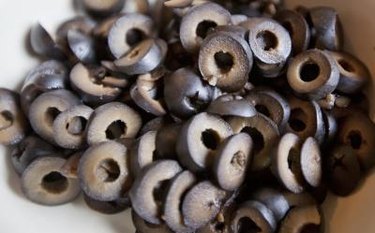
The olive is a fruit that grows on trees. When fully ripened, it turns a black color; however, not all ripe olives are naturally black. Processing methods, such as fermentation, or exposure to air may cause this fruit to turn a darker color. Olives vary in color, origin, size, shape and flavor. According to the California Rare Fruit Growers website, olives cannot be eaten right off of the tree; they require special processing to reduce their highly bitter flavor. Olives offer a variety of health benefits.
Description and Composition
Video of the Day
Olives are grown on a tree known as Olea europaea. The name of this tree describes both the composition of this fruit and its origin. "Olea" is Latin for "oil," and reflects the very high fat content of olives. Like cashews, 75 percent of the fat in olives comes from oleic acid, a monounsaturated fat that offers health benefits, such as anti-inflammation and lowering cholesterol. "Europaea" refers to olive's native origin; the Mediterranean region of Europe.
Video of the Day
Important Source of "E"
Vitamin E is an antioxidant nutrient that supports immune system function and protects the body's cells, particularly those of the brain, lung and red blood cells, from damage. According to results of the National Health and Nutrition Examination Survey published in the "Journal of Nutrition" in 2006, vitamin E, along with iron and potassium, is a nutrient commonly deficient in the diets of most Americans. One cup of black olives meets over 20 percent of the Recommended Daily Value or DV for vitamin E and, according to the National Institutes of Health, ingesting this nutrient from foods high in unsaturated fats, such as oils, nuts, olives and seeds, enhances absorption.
Heart-Healthy Fat
Most of the fat in black olives is heart-healthy monounsaturated fat. In fact, out of the 14.4g total fat in one cup, 10.5g is monounsaturated fat, like the fat found in avocados and macadamia nuts. Olives are one of the best food sources of monounsaturated fats. According to the U.S. Department of Agriculture Dietary Guidelines for Americans, for optimum health, the fat you eat should be from foods rich in mono-and polyunsaturated fats, as these fats may lower LDL or "bad" cholesterol levels and increase HDL or "good" cholesterol levels.
Anti-Inflammatory
Although black olives offer a variety of health benefits, they should be enjoyed within the context of an overall nutrient-rich, fat-controlled, fiber-rich diet. Some of the saturated and trans fat in your diet should be replaced with, not added to, foods rich in mono- and polyunsaturated fats. In addition, canned, pitted black olives are high in sodium. Six whole, pitted, black olives, from canned, provide 270mg sodium, or roughly 12 percent of the recommended daily limit. For a heart-healthy diet, it's important to watch your intake of sodium, even if it comes from healthful foods.
Considerations
Although black olives offer a variety of health benefits, they should be enjoyed within the context of an overall nutrient-rich, fat-controlled, fiber-rich diet. Some of the saturated and trans fat in your diet should be replaced with, not added to, foods rich in mono- and polyunsaturated fats. In addition, canned, pitted black olives are high in sodium. Six whole, pitted, black olives, from canned, provide 270mg sodium, or roughly 12 percent of the recommended daily limit. For a heart-healthy diet, it's important to watch your intake of sodium, even if it comes from healthful foods.